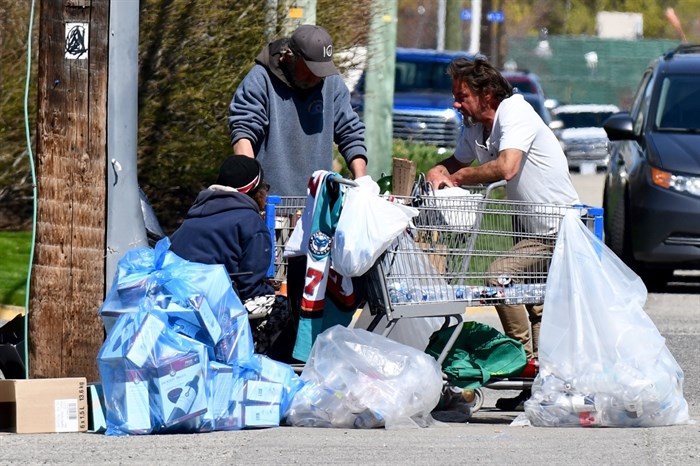
(JOHN MCDONALD / iNFOnews.ca)
January 25, 2022 - 2:30 PM
Interior Health has greatly increased its staff and resources to help some of the most troubled street entrenched people on city streets throughout its region.
While that was welcome news to Kelowna city councillors during a presentation by Interior Health Monday, Jan. 24, it just doesn’t work for everyone.
“I find it very disturbing that there are a number of people who are on our streets today that have been there for quite awhile,” Coun. Charlie Hodge said after the formal presentation.
“They literally have some significant mental health issues going on yet they continue to remain on the street. My question to you, when you have people who are continually struggling and they’re not getting any better... people are falling through the cracks. What can we do here?”
One of the answers is the Mental Health Act, which is unique to B.C. and allows for involuntary detention of those meeting its criteria.
“Involuntary detention, under the Mental Health Act, is arguably the most profound infringement of human rights that is actually legislated outside the criminal justice system,” Dr. Dr. Paul Carey, medical director for Interior Health’s Mental Health and Substance Use division told council. “It’s also our obligation, under law, to be detaining those people who we believe fulfil those criteria and require treatment and, they themselves, are not able to consent or request treatment at that point of care.”
It’s the criteria for detention that are at the heart of the matter.
In order to be detained, a person has to have a serious mental health disorder, be incapable of making decisions about their treatment and be at risk of doing harm to themselves or others.
Being so drunk or stoned as to need hospitalization is not enough to warrant detention once they sober up. Neither does engaging in criminal activities qualify.
So, there are people who do have mental disorders and do make bad decisions that people like Carey believe could be helped by treatment but who can’t be forced into that treatment.
“It’s very intuitively appealing to all of us, let’s be frank,” he said. “It does not work for people and, very quickly, we run the lines of further alienating people, marginalizing them and, frankly, traumatizing them by virtue of some of our interventions.”
There are some things that can be done and are being done.
Debi Morris, network director for the Mental Health and Substance Use division, said there have been significant investments in the unit in the past year. It now has 50 or so people and is growing.
Interior Health is a leader in using “nurse prescribers” who have written more than 300 prescriptions for legal opioids, freeing up physicians.
There’s more work being done to partner with the RCMP to deal with calls that have a mental health component. While nurses are on call 24 hours a day, they’ve yet to receive many calls from police, Morris said.
Instead of sitting in offices waiting for clients to come to them, workers are now spending much more time going out on the streets to see clients.
At the other end of the spectrum, there’s been a dramatic increase in people involuntarily detained for treatment, despite the limitations of the Mental Health Act.
Still more needs to be done.
Carey pointed out that there’s a great shortage of funding for treatment on the provincial and national level.
Some of those most in need do not function well in traditional housing so other models are needed, he added.
READ MORE: B.C. urban mayors renew call for complex care for vulnerable people across B.C.
Morris noted there are still far too many “silos” throughout the system.
“One of the challenges around provincial advocacy is, how do we step outside our own silos?” she said. “We all have them and often it’s driven by money. The money flows through our own mandates, whether that’s healthcare, housing, whatever that may be. So how do we start to wrap the care around the client and let the money follow the client? We are all working in these separate pockets. I think, until we can get to that point, we will continue to see silos in this work.”
Carey agreed with Hodge that some people are falling through the cracks, but that depends on perspective.
He’s from South Africa and came to Canada 13 years ago where he met a street entrenched person who had serious mental health and addiction issues.
Carey learned that he had spent five years in high school with this person, who was being seriously abused by his father during that time. He now struggles with his addictions and mental health even after Carey has tried to work with him over the last 13 years.
“It gives you a bit of a picture, I hope, about how complex this can be and how a cure and ‘fix’ is really not a likely or reasonable goal for him,” Carey said. “We want to continue to see him find some quality of life. To not be marginalized. To be safe. To be alive.”
To contact a reporter for this story, email Rob Munro or call 250-808-0143 or email the editor. You can also submit photos, videos or news tips to the newsroom and be entered to win a monthly prize draw.
We welcome your comments and opinions on our stories but play nice. We won't censor or delete comments unless they contain off-topic statements or links, unnecessary vulgarity, false facts, spam or obviously fake profiles. If you have any concerns about what you see in comments, email the editor in the link above.
News from © iNFOnews, 2022